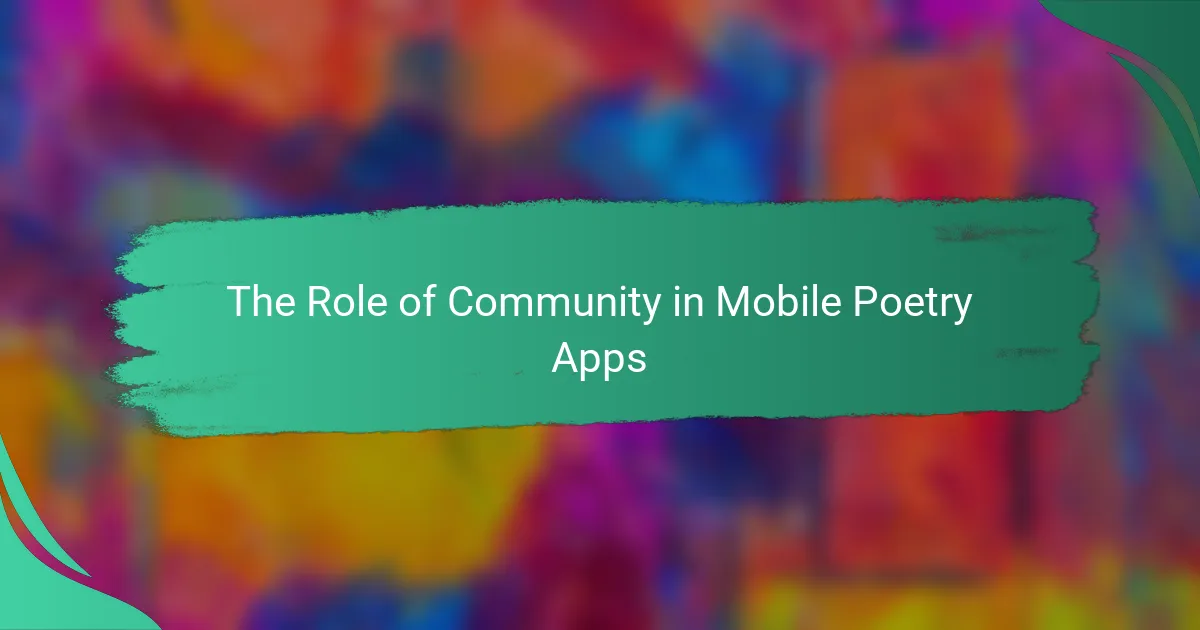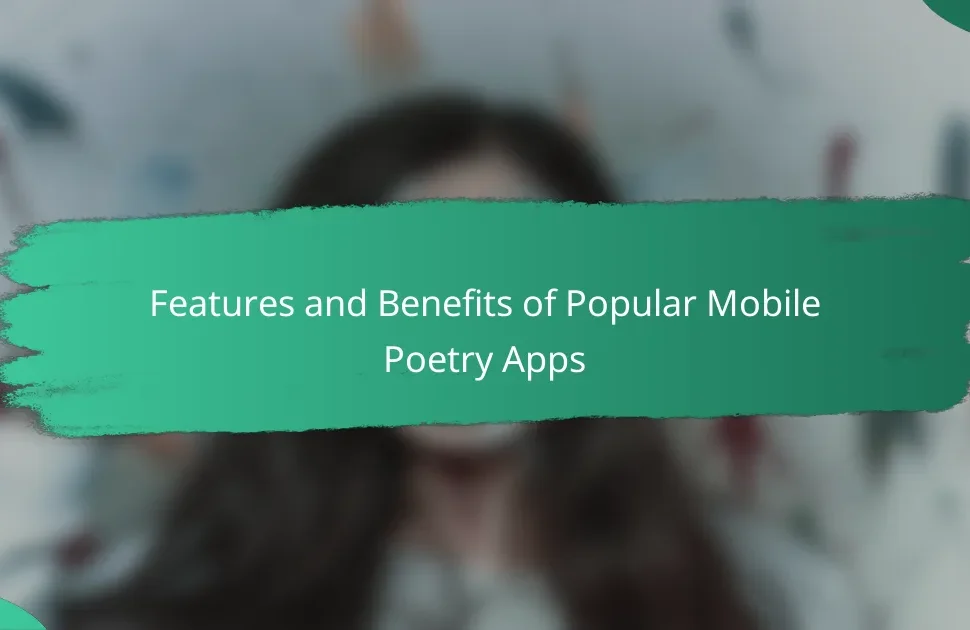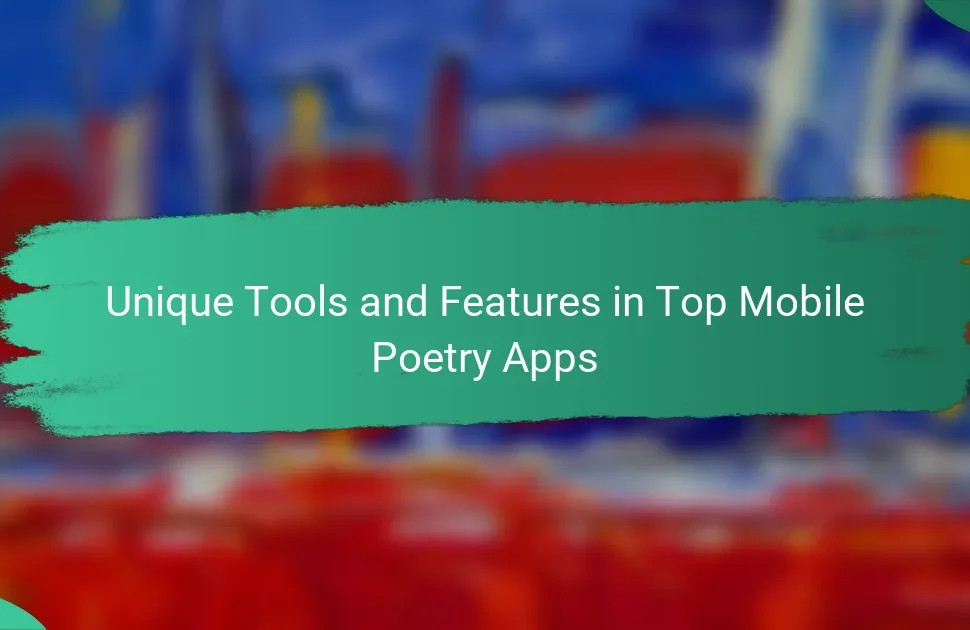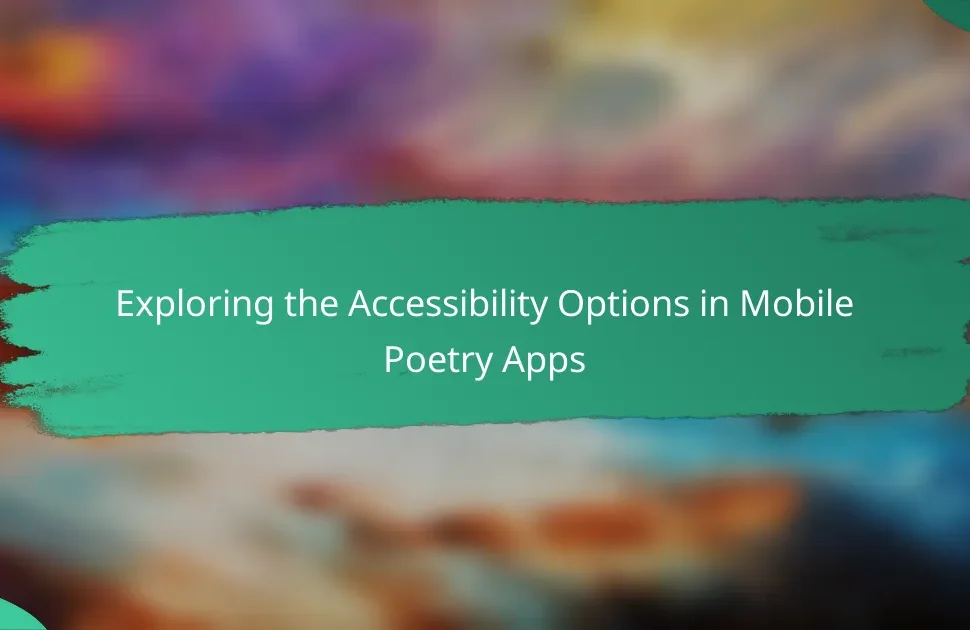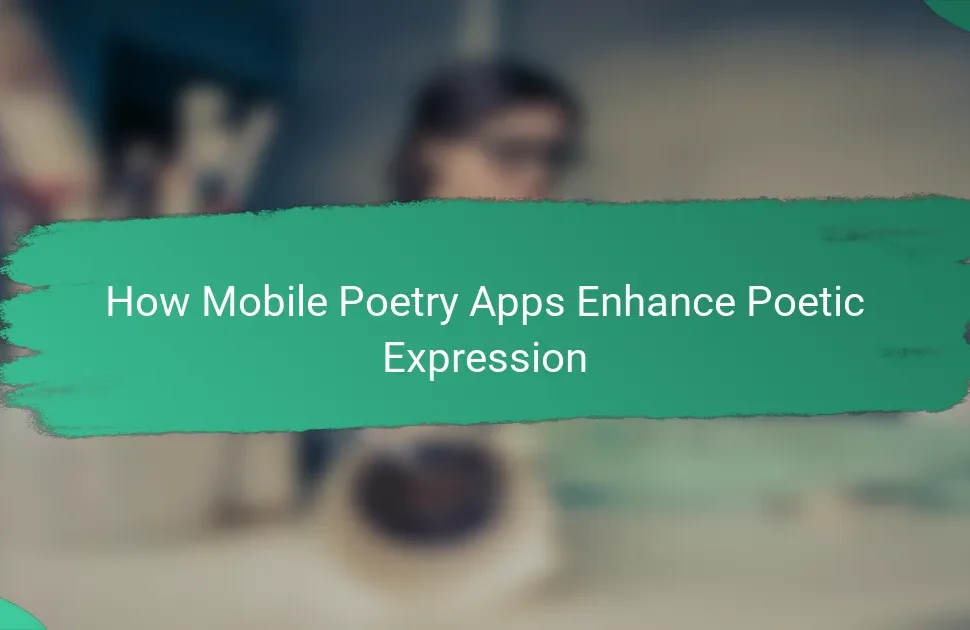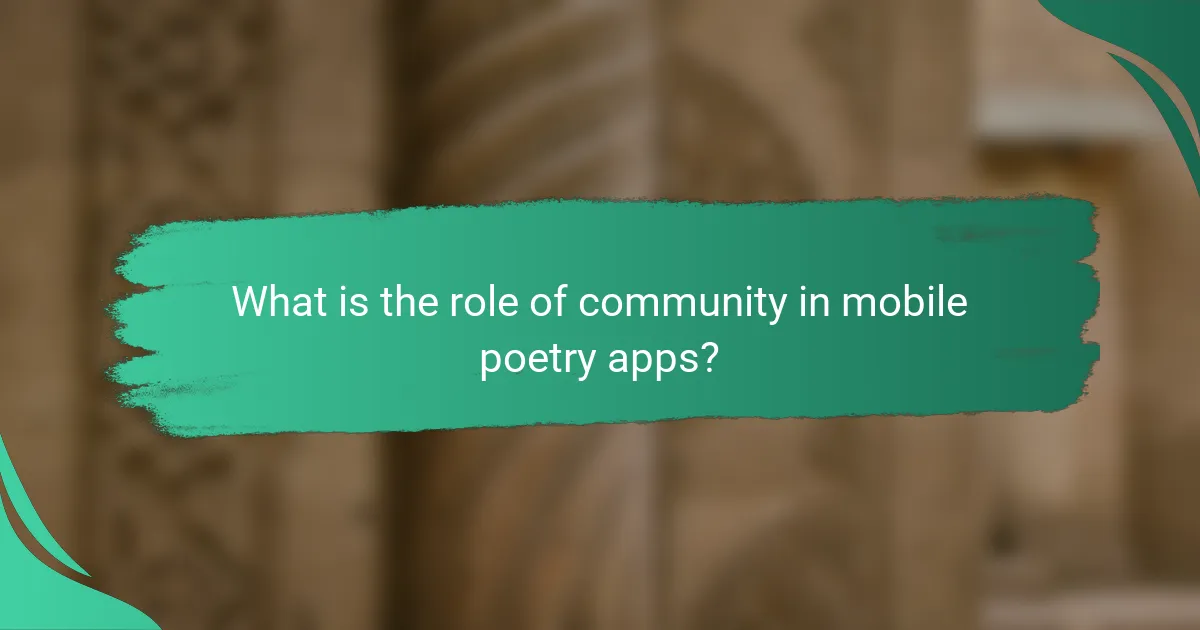
What is the role of community in mobile poetry apps?
Community plays a crucial role in mobile poetry apps. It fosters engagement among users and enhances the overall experience. Users can share their work, receive feedback, and connect with fellow poets. This interaction cultivates a supportive environment that encourages creativity. Community features, such as forums and comment sections, promote discussion and collaboration. Research shows that social interaction increases user retention in mobile applications. A study by the Pew Research Center indicates that 72% of users value community support in creative platforms. Thus, community is integral to the success and functionality of mobile poetry apps.
How do mobile poetry apps facilitate community engagement?
Mobile poetry apps facilitate community engagement by providing platforms for users to share their work and connect with others. These apps often include features like forums, comment sections, and collaborative writing tools. Users can post their poems and receive feedback from peers. This interaction fosters a sense of belonging among poets. Many apps also host contests or challenges that encourage participation. Events organized within these apps can bring users together in real-time. Additionally, social media integration allows for wider sharing of poetry. Research shows that community interaction boosts user engagement and retention in creative apps.
What features promote interaction among users in mobile poetry apps?
User-generated content features promote interaction among users in mobile poetry apps. These features allow users to create and share their own poems. Comment sections enable feedback and discussion among users. Voting mechanisms encourage engagement by allowing users to express appreciation for poems. Collaborative writing tools foster teamwork in creating poetry. Social sharing options extend interactions beyond the app to other platforms. Notifications about user activity keep users informed and engaged. Community challenges inspire participation and creativity among users. These features collectively enhance the sense of community within mobile poetry apps.
How do these interactions enhance the user experience?
Interactions within mobile poetry apps enhance the user experience by fostering a sense of community. Users feel more connected when they engage with others through sharing and feedback. This engagement leads to increased motivation for users to create and share their work. Studies show that community-driven platforms can improve user retention rates by up to 30%. Users benefit from diverse perspectives and constructive criticism, which helps refine their poetry skills. Additionally, collaborative features, such as group writing prompts, encourage creativity and exploration. Overall, these interactions create a supportive environment that enriches the artistic journey.
Why is community important for mobile poetry app users?
Community is important for mobile poetry app users because it fosters connection and collaboration. Users can share their work, receive feedback, and engage in discussions. This interaction enhances creativity and inspiration among poets. A supportive community encourages users to express themselves freely. Research shows that social interactions improve user retention in digital platforms. For example, a study by the Pew Research Center found that 72% of users value online communities for emotional support. Thus, community significantly enriches the experience of mobile poetry app users.
What emotional benefits do users gain from community involvement?
Users gain emotional benefits from community involvement, including increased feelings of belonging and support. Engaging with a community fosters connections with like-minded individuals. This connection can lead to enhanced self-esteem and confidence. Studies show that social interactions reduce feelings of loneliness. Community involvement also promotes a sense of purpose and fulfillment. Participants often report greater happiness and life satisfaction. Emotional resilience can improve through shared experiences and mutual encouragement. Overall, community involvement significantly enhances emotional well-being.
How does community support creativity and collaboration among poets?
Community fosters creativity and collaboration among poets through shared experiences and mutual encouragement. Poets benefit from feedback and inspiration within a supportive environment. Workshops and open mic events provide platforms for poets to showcase their work. These gatherings encourage networking and mentorship opportunities. Collaborative projects often arise from these interactions. Online platforms enable poets to connect globally, sharing diverse perspectives. Research shows that social interaction enhances creative output. A study by the American Psychological Association highlights that collaboration can lead to higher levels of creativity. Thus, community plays a crucial role in nurturing poetic expression.
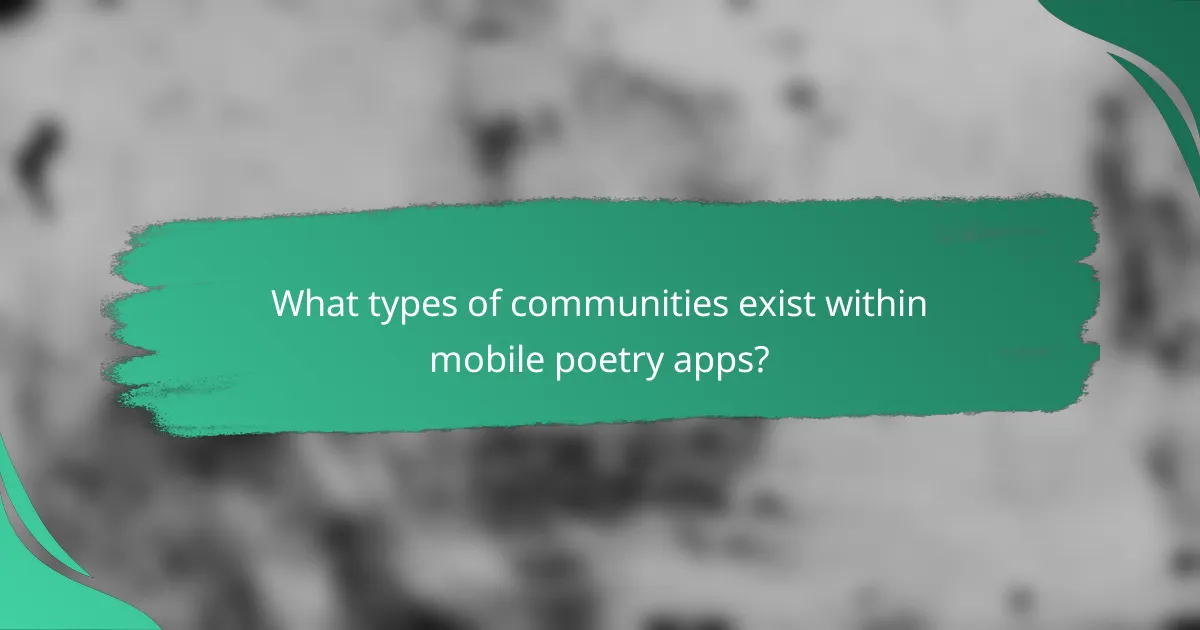
What types of communities exist within mobile poetry apps?
Mobile poetry apps host various types of communities. These communities include writers, readers, and critics. Writer communities focus on sharing original poetry and receiving feedback. Reader communities engage with poetry, discussing themes and styles. Critics offer analysis and critique of poems shared within the app. Additionally, some apps foster niche communities based on specific genres or styles. For example, there may be communities dedicated to haiku or spoken word. Each community enhances user interaction and promotes creativity. These interactions often lead to collaborative projects and challenges, further enriching the community experience.
How do different communities form around mobile poetry apps?
Different communities form around mobile poetry apps through shared interests and interactive features. Users connect via forums, comment sections, and social media integration. These platforms enable poets to share their work and receive feedback. Collaborative writing features also foster community engagement. Events such as poetry slams and contests encourage participation. Users often form groups based on styles, themes, or goals. The accessibility of mobile apps allows diverse voices to join. This inclusivity enhances the richness of community interactions.
What are the characteristics of niche poetry communities?
Niche poetry communities are characterized by their focused themes and shared interests. Members often engage with specific genres, styles, or topics. These communities foster intimate connections among poets and readers. They provide a platform for sharing unique voices and perspectives. Many niche poetry communities utilize online platforms for accessibility. Social media groups and forums are common venues for interaction. Events such as readings and workshops often strengthen community ties. The emphasis on support and feedback cultivates a nurturing environment for creativity.
How do general poetry communities differ from specialized ones?
General poetry communities encompass a broad range of poetic styles and interests. These communities welcome diverse voices and encourage various forms of expression. In contrast, specialized poetry communities focus on specific genres, themes, or styles, such as haiku or spoken word. Members of specialized communities often share a deep understanding of particular techniques and conventions. General communities may prioritize inclusivity and accessibility over technical mastery. Specialized communities often provide targeted feedback tailored to the specific genre. This distinction allows for different types of engagement and learning opportunities within each community.
What roles do moderators and administrators play in these communities?
Moderators and administrators maintain order and facilitate engagement in mobile poetry app communities. Moderators enforce community guidelines and ensure respectful interactions among users. They monitor discussions and manage conflicts to promote a positive environment. Administrators oversee the overall functionality of the community platform. They implement updates and manage user permissions. Both roles are essential for sustaining a healthy community atmosphere. Research shows that effective moderation leads to increased user satisfaction and retention. Thus, their roles directly impact community growth and user experience.
How do they maintain a positive environment for users?
Mobile poetry apps maintain a positive environment for users by fostering community engagement and support. They implement features such as user forums and feedback systems. These platforms encourage sharing and collaboration among users. Regular community events and challenges stimulate creativity. Additionally, moderation policies prevent negativity and harassment. User guidelines promote respectful interactions. Positive reinforcement through rewards and recognition enhances user experience. Statistics show that engaged communities lead to higher user satisfaction and retention.
What challenges do they face in managing community interactions?
They face several challenges in managing community interactions. One challenge is ensuring effective communication among users. Misunderstandings can arise due to the lack of non-verbal cues in digital interactions. Another challenge is moderating content to prevent harassment or inappropriate behavior. This requires constant monitoring and clear guidelines. Additionally, fostering engagement can be difficult. Users may feel disconnected or unmotivated to participate actively. Balancing diverse opinions within the community also presents a challenge. Conflicting views can lead to disputes that need resolution. Lastly, maintaining a sense of belonging is essential but can be hard to achieve in a virtual environment. These challenges impact the overall user experience and community health in mobile poetry apps.
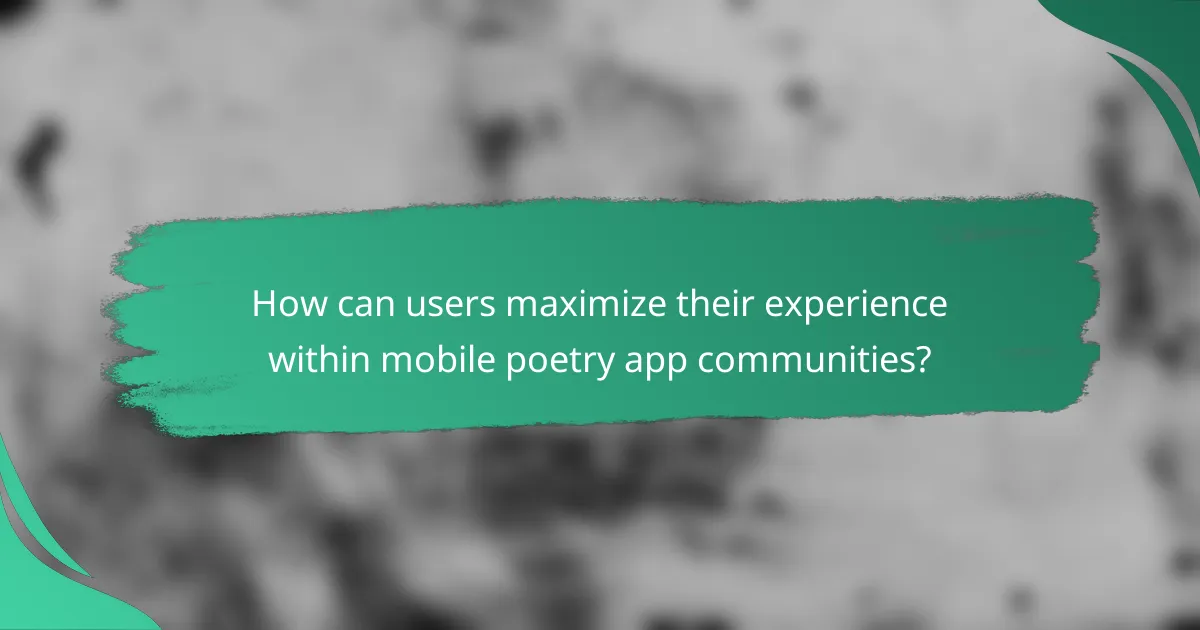
How can users maximize their experience within mobile poetry app communities?
Users can maximize their experience within mobile poetry app communities by actively participating in discussions and sharing their work. Engaging with fellow poets fosters connections and encourages feedback. Users should also explore various features of the app, such as prompts and challenges, to inspire creativity.
Regularly reading and commenting on others’ poetry enhances community interaction. Joining groups or forums within the app can provide a sense of belonging. Utilizing social sharing options can expand one’s audience and gain recognition. Participating in community events or contests can further enhance the experience.
Research indicates that active engagement in online communities leads to higher satisfaction and creative growth. According to a study by the Pew Research Center, 72% of users find value in community interactions for personal development.
What best practices should users follow to engage effectively?
Users should actively participate in discussions to engage effectively. Engaging in conversations fosters a sense of community. Sharing original poetry encourages interaction and feedback. Commenting on others’ work builds connections and support. Attending virtual events enhances visibility and networking. Providing constructive feedback promotes a positive atmosphere. Utilizing app features, like sharing or liking, increases engagement. Consistency in participation keeps users connected and involved.
How can users provide constructive feedback to peers?
Users can provide constructive feedback to peers by focusing on specific aspects of their work. They should start by highlighting strengths before addressing areas for improvement. This balanced approach fosters a positive environment. Users can be specific about what they liked or found effective. They should also suggest actionable changes rather than vague critiques. Using examples from the work can clarify their points. Encouraging open dialogue allows for deeper understanding. This method enhances learning and growth within the community. Overall, constructive feedback promotes collaboration and improvement among peers.
What strategies can users employ to foster meaningful connections?
Users can employ several strategies to foster meaningful connections in mobile poetry apps. First, they can actively participate in community discussions. Engaging in conversations about poetry enhances relationships. Second, sharing personal poetry encourages interaction. Users who share their work invite feedback and connection. Third, providing constructive feedback builds trust. Thoughtful critiques can deepen relationships among users. Fourth, attending virtual events fosters community spirit. Events like readings or workshops create shared experiences. Fifth, collaborating on poetry projects promotes teamwork. Joint efforts can strengthen bonds between users. Lastly, utilizing social media integration allows for broader connections. Linking profiles can lead to interactions beyond the app. These strategies collectively enhance user engagement and connection within the community.
What common pitfalls should users avoid in mobile poetry app communities?
Users should avoid negative criticism in mobile poetry app communities. Harsh feedback can discourage creativity and participation. Instead, constructive criticism fosters growth and improvement. Users should also refrain from plagiarism. Originality is essential in poetry, and copying undermines community trust. Engaging in arguments or drama is another pitfall. Disputes can create a toxic environment and drive members away. Users should avoid spamming the community with excessive posts. Quality over quantity is vital for meaningful interactions. Additionally, ignoring community guidelines can lead to exclusion. Adhering to rules maintains a respectful and supportive atmosphere. Lastly, users should not compare themselves negatively to others. Each poet has a unique voice and journey.
How can negative interactions impact the community atmosphere?
Negative interactions can significantly harm the community atmosphere. They lead to feelings of distrust and isolation among members. When individuals experience negativity, their willingness to participate decreases. This can result in a lack of engagement in community activities. Studies show that toxic interactions can drive away users, reducing overall participation. A survey indicated that 70% of participants left communities due to negative experiences. Furthermore, persistent negative behavior can create a hostile environment. This ultimately undermines the core purpose of community-building in mobile poetry apps.
What steps can users take to mitigate conflicts within the community?
Users can mitigate conflicts within the community by promoting open communication. Encouraging dialogue helps clarify misunderstandings. Creating a safe space for expression fosters trust among members. Establishing clear community guidelines sets expectations for behavior. Actively listening to differing viewpoints can reduce tensions. Seeking mediation from neutral parties can resolve disputes effectively. Regularly organizing community events strengthens relationships and collaboration. Finally, providing constructive feedback promotes a positive atmosphere. These steps contribute to a cohesive and supportive community environment.
What resources are available for users to enhance their community experience?
Users can enhance their community experience in mobile poetry apps through various resources. These resources include forums for discussion, where users can share insights and feedback. Many apps also provide collaborative writing features, allowing users to co-create poems. Access to workshops and events fosters skill development and community engagement. Social media integration enables users to connect with a broader audience. Additionally, user-generated content showcases diverse voices within the community. Notifications about updates and community highlights keep users informed and engaged. These resources collectively contribute to a richer community experience in mobile poetry apps.
How can users find workshops or events within the app?
Users can find workshops or events within the app by navigating to the events section. This section is typically accessible from the main menu or dashboard. Users can filter events by date, type, or location. The app may also feature a search function for specific workshops. Notifications or announcements may highlight upcoming events. Users can RSVP directly through the app for participation. Additionally, community forums within the app may provide information on local events. This structure ensures users have multiple ways to discover and engage with workshops and events.
What online forums or external resources complement mobile poetry app communities?
Online forums and external resources that complement mobile poetry app communities include platforms like Reddit, Facebook Groups, and dedicated poetry websites. Reddit has specific subreddits such as r/Poetry and r/Poets, fostering discussion and sharing. Facebook Groups allow poets to connect and exchange feedback in a more personal setting. Websites like Poetry Foundation and AllPoetry provide extensive resources, including articles, contests, and forums for interaction. These platforms enhance the sense of community and provide additional avenues for sharing and learning.
The main entity of this article is community within mobile poetry apps. The article explores how community engagement enhances user experience by fostering creativity, collaboration, and emotional support among poets. It discusses various community features that promote interaction, such as forums, comment sections, and collaborative tools, while highlighting the emotional benefits users gain from participation. Additionally, the article examines the characteristics of different types of communities, the roles of moderators, and strategies for users to maximize their experience and mitigate conflicts. Overall, it emphasizes the integral role of community in the success and functionality of mobile poetry applications.
